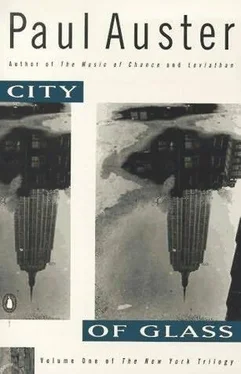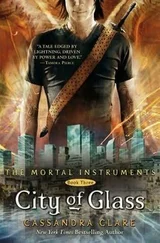Paul Auster - City of Glass
Здесь есть возможность читать онлайн «Paul Auster - City of Glass» весь текст электронной книги совершенно бесплатно (целиком полную версию без сокращений). В некоторых случаях можно слушать аудио, скачать через торрент в формате fb2 и присутствует краткое содержание. Жанр: Современная проза, на английском языке. Описание произведения, (предисловие) а так же отзывы посетителей доступны на портале библиотеки ЛибКат.
- Название:City of Glass
- Автор:
- Жанр:
- Год:неизвестен
- ISBN:нет данных
- Рейтинг книги:5 / 5. Голосов: 1
-
Избранное:Добавить в избранное
- Отзывы:
-
Ваша оценка:
- 100
- 1
- 2
- 3
- 4
- 5
City of Glass: краткое содержание, описание и аннотация
Предлагаем к чтению аннотацию, описание, краткое содержание или предисловие (зависит от того, что написал сам автор книги «City of Glass»). Если вы не нашли необходимую информацию о книге — напишите в комментариях, мы постараемся отыскать её.
City of Glass — читать онлайн бесплатно полную книгу (весь текст) целиком
Ниже представлен текст книги, разбитый по страницам. Система сохранения места последней прочитанной страницы, позволяет с удобством читать онлайн бесплатно книгу «City of Glass», без необходимости каждый раз заново искать на чём Вы остановились. Поставьте закладку, и сможете в любой момент перейти на страницу, на которой закончили чтение.
Интервал:
Закладка:
The next time he woke up, the sun was shining in the room. There was a tray of food beside him on the floor, the dishes Beaming with what looked like a roast beef dinner. Quinn accepted this fact without protest. He was neither surprised nor disturbed by it. Yes, he said to himself, it is perfectly possible that food should have been left here for me. He was not curious to know how or why this had taken place. It did not even occur to him to leave the room to look through the rest of the apartment for an answer. Rather, he examined the ' food on the tray more closely and saw that in addition to two large slices of roast beef there were seven little roast potatoes, a plate of asparagus, a fresh roll, a salad, a carafe of red wine, and wedges of cheese and a pear for dessert. There was a white linen napkin, and the silverware was of the finest quality. Quinn ate the food-or half of it, which was as much as he could manage.
After his meal, he began to write in the red notebook. He continued writing until darkness returned to the room. There was a small light fixture in the middle of the ceiling and a switch for it by the door, but the thought of using it did not appeal to Quinn. Not long after that he fell asleep again. When he woke up, there was sunlight in the room and another tray of food beside him on the floor. He ate what he could of the food and then went back to writing in the red notebook.
For the most part his entries from this period consisted of marginal questions concerning the Stillman case. Quinn wondered, for example, why he had not bothered to look up the newspaper reports of Stillman's arrest in 1969. He examined the problem of whether the moon landing of that same year had been connected in any way with what had happened. He asked himself why he had taken Auster's word for it that Stillman was dead. He tried to think about eggs and wrote out such phrases as "a good egg," "egg on his face," "to lay an egg," "to be as like as two eggs." He wondered what would have happened if he had followed the second Stillman instead of the first. He asked himself why Christopher, the patron saint of travel, had been decanonized by the Pope in 1969, just at the time of the trip to the moon. He thought through the question of why Don Quixote had not simply wanted to write books like the ones he loved-instead of living out their adventures. He wondered why he had the same initials as Don Quixote. He considered whether the girl who had moved into his apartment was the same girl he had seen in Grand Central Station reading his book. He wondered if Virginia Stillman had hired another detective after he failed to get in touch with her. He asked himself why he had taken Auster's word for it that the check had bounced. He thought about Peter Stillman and wondered if he had ever slept in the room he was in now. He wondered if the case was really over or if he was not somehow still working on it. He wondered what the map would look like of all the steps he had taken in his life and what word it would spell.
When it was dark, Quinn slept, and when it was light he ate the food and wrote in the red, notebook. He could never be sure how much time passed during each interval, for he did not concern himself with counting the days or the hours. It seemed to him, however, that little by little the darkness had begun to win "out over the light, that whereas in the beginning there had been a predominance of sunshine, the light had gradually become fainter and more fleeting. At first, he attributed this to a change of season. The equinox had surely passed already, and perhaps the solstice was approaching. But even after winter had come and the process should theoretically have started to reverse itself, Quinn observed that the periods of dark nevertheless kept gaining on the periods of light. It seemed to him that he had less and less time to eat his food and write in the red notebook. Eventually, it seemed to him that these periods had been reduced to a matter of minutes. Once, for example, he finished his food and discovered that there was only enough time to write three sentences in the notebook. The next time there was light, he could only manage two sentences. He began to skip his meals in order to devote himself to the red notebook, eating only when he felt he could no longer hold out. But the time continued to diminish, and soon he was able to eat no more than a bite or two before the darkness came back. He did not think of turning on the electric light, for he had long ago forgotten it was there.
This period of growing darkness coincided with the dwindling of pages in the red notebook. Little by little, Quinn was coming to the end. At a certain point, he realized that the more he wrote, the sooner the time would come when he could no longer write anything. He began to weigh his words with great care, struggling to express himself as economically and clearly as possible. He regretted having wasted so many pages at the beginning of the red notebook, and in fact felt sorry, that he had bothered to write about the Stillman case at all. For the case was far behind him now, and he no longer bothered to think about it. It had been a bridge to another place in his life, and now that he had crossed it, its meaning had been lost. Quinn no longer had any interest in himself. He wrote about the stars, the earth, his hopes for mankind. He felt that his words had been severed from him, that now they were a part of the world at large, as real and specific as a stone, or a lake, or a flower. They no longer had anything to do with him. He remembered the moment of his birth and how he had been pulled gently from his mother's womb. He remembered the infinite kindnesses of the world and all the people he had ever loved. Nothing mattered now but the beauty of all this ' He wanted to go on writing about it, and it pained him to know that this would not be possible. Nevertheless, he tried to face the end of the red notebook with courage. He wondered if he had it in him to write without a pen, if he could learn to speak instead, filling the darkness with his voice, speaking the words into the air, into the walls, into the city,. even if the light never came back again.
The last sentence of the red notebook reads: "What will happen when there are no more pages in the red notebook?"
At this point the story grows obscure. The information has run out, and the events that follow this last sentence will never be known. It would be foolish even to hazard a guess.
I returned home from my trip to Africa in February, just hours before a snowstorm began to fall on New York. I called my friend Auster that evening, and he urged me to come over to see him as soon as I could. There was something so insistent in his voice that I dared not refuse, even though I was exhausted.
At his apartment, Auster explained to me what little he knew about Quinn, and then he went on to describe the strange case he had accidentally become involved in. He had become obsessed by it, he said, and he wanted my advice about what he should do. Having heard him out, I began to feel angry that he had treated Quinn with such indifference. I scolded him for not having taken a greater part in events, for not having done something to help a man who was so obviously in trouble.
Auster seemed to take my words to heart. In fact, he said, that was why he had asked me over. He had been feeling guilty and needed to unburden himself He said that I was the only person he could trust.
He had spent the last several months trying to track down Quinn, but with no success. Quinn was no longer living in his apartment, and all attempts to reach Virginia Stillman had failed. It was then that I suggested that we take a look at the Stillman apartment. Somehow, I had an intuition that this was where Quinn had wound up.
We put on our coats, went outside, and took a cab to East 69th Street. The snow had been falling for an hour, and already the roads were treacherous. We had little trouble getting into the building-slipping through the door with one of the tenants who was just coming home. We went upstairs and found the door to what had once been the Stillmans' apartment. It was unlocked. We stepped in cautiously and discovered a series of bare, empty rooms. In a small room at the back, impeccably clean as all the other rooms were, the red notebook was lying on the floor. Auster picked it up, looked through it briefly, and said that it was Quinn's. Then he handed it to me and said that I should keep it. The whole business had upset him so much that he was afraid to keep it himself I said that I would hold on to it until he was ready to read it, but he shook his head and told me that he never wanted to see it again. Then we left and walked out into the snow. The city was entirely white now, and the snow kept falling, as though it would never end.
Читать дальшеИнтервал:
Закладка:
Похожие книги на «City of Glass»
Представляем Вашему вниманию похожие книги на «City of Glass» списком для выбора. Мы отобрали схожую по названию и смыслу литературу в надежде предоставить читателям больше вариантов отыскать новые, интересные, ещё непрочитанные произведения.
Обсуждение, отзывы о книге «City of Glass» и просто собственные мнения читателей. Оставьте ваши комментарии, напишите, что Вы думаете о произведении, его смысле или главных героях. Укажите что конкретно понравилось, а что нет, и почему Вы так считаете.












